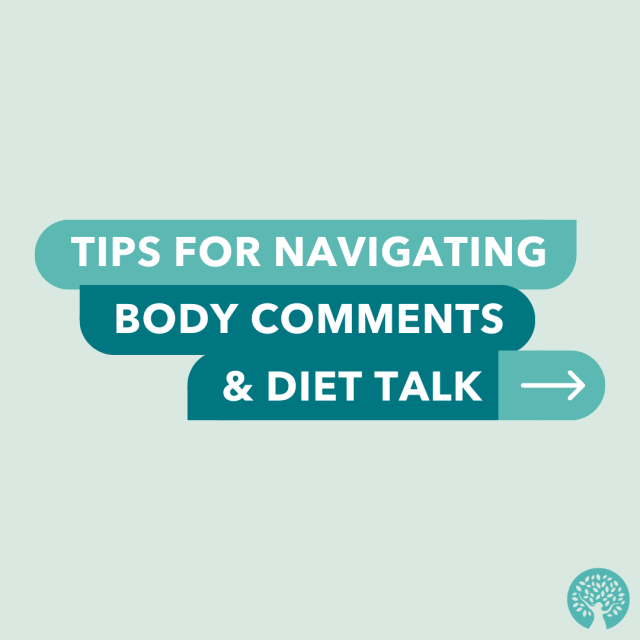Tips for Navigating Body Comments & Diet Talk
Author:
Megan Simpson Teeter

Whether it's your aunt commenting on your weight at a family gathering or a friend singing the praises of the latest fad diet over brunch, these moments can leave us wrestling with feelings of shame and discomfort. Finding the right words to navigate these conversations can feel daunting. The key is simple: Prepare yourself with knowledge, practical scripts and boundary-setting techniques to tackle body comments, diet talk and the spectrum of feelings that come up along the way.
"Body comments and diet talk can mirror the disordered or negative thoughts we have about ourselves, and can provide a sense of confirmation that others are watching or judging our bodies or food choices," Meredith Nisbet (she/her), MS, LMFT, CEDS-S, national clinical response manager at Eating Recovery Center (ERC), explains. "This can lead to an increasingly negative self-perception, negative self-talk and/or a renewed commitment to change the body."
Understanding the motivations behind these conversations can equip you with a thoughtful and empathetic approach to chatting about body image and food choices. We'll also look at comments like these through a cultural lens, recognizing that discussions about body shape and size may run deep in certain cultures.
What do I do when someone comments on my body?
Whether it’s a loved one, a casual acquaintance or a complete stranger commenting on our body shape or size, it can come as a shock to our system. And, depending on where you are in your journey, it might trigger eating disorder thoughts and behaviors.
Sydney Fitzgibbons, ERC alum and Recovery Ambassador Council member, encourages family members to steer clear of weight-specific comments, namely, the well-intentioned compliments that loved ones believe to be harmless.
“When we compliment someone about their weight change, we (1) assume it was intentional and (2) assume it has been a positive, non-disordered experience for the individual,” explains Fitzgibbons. “This type of comment may be an invitation for someone to question how they looked before. Or it may be the comment that confirms their disordered thoughts. Compliment their intellect, smile, humor, vibe, warmth … not their weight."
Let's talk about how to handle these sensitive situations effectively. If someone comments on your body shape or size, recent weight change or food choices, you can:
- Take a deep breath. This will help you stay calm and collected, allowing space for a more thoughtful reply.
- Set boundaries or redirect the conversation. Consider setting boundaries (more on this below!) with family members or loved ones. If you find yourself in a conversation about food or bodies that makes you feel uncomfortable, gently steer it toward a different topic.
- Limit exposure. Save your time and space for people in your life who support your mental health and respect your boundaries. Unfollow social media accounts that share body- or diet-related messages that do not align with your values.
What to say to others: Real-time scripts
Set boundaries
Sometimes you don't have the energy to engage. That's more than okay. Protect your peace. If you want to disengage quickly, follow the low-energy scripts below. Check out the high-energy scripts and other sections below if you're feeling up to it, or if you know that your loved one is open to some light education.
Low Energy
- "Eh, I'm trying to have a more positive outlook on myself."
- "You know what, let's talk about something else."
- "Actually, I need to use the bathroom. I'll be back!"
High Energy
- "Honestly, Nana, I really don't appreciate comments about my body, and I'd like you to stop."
- "Look, I understand what you're trying to say – but let's avoid discussing my appearance."
- "You know I love you/value you/respect your opinion. I just need you to respect my wishes to not comment on my body."
Redirect
- "I'd love to hear about what's going on in your life. What's new with you these days?"
- "You know, I've actually been wanting to hear your opinion on [a different subject]. What do you think about it?"
- "Oh, did I tell you? I've been getting into [a hobby or interest you share]. Have you tried anything new recently?"
Communicate your feelings
- "On a more serious note, I hope you understand that talking about my body that way hurts me."
- "It probably doesn't seem like a big deal to you, but hearing these comments really hurts my self-esteem and how I feel about myself."
- "I want us to have a fun time today/this evening/this weekend, and those comments about my body make it harder for me."
Educate
- “Sometimes people’s bodies look different – that’s true anywhere and everywhere. The way someone looks isn’t tied to their worth or their health. I’ve been trying to unlearn those stereotypes myself recently.”
- "I honestly believe our talks could be more meaningful if we steer away from body stuff and instead focus on the positive and being there for each other. That's the vibe I'm trying to bring into my life."
- "I'm bringing this up not to point fingers but because I want us to understand each other better and chat more openly. How do you feel about all this?"
“Share that body diversity has existed for millions of years, that there are many, many determinants of health beyond weight, that the definition of health changes depending on who you ask, and point out the discrimination folks in larger bodies regularly experience. Provide resources for folks to learn if interested, as well,” notes Nisbet.
Quick phrases
- "How about we chat about something else?"
- "Can we switch gears? Not down to talk about that today."
- "Let's keep it positive and steer clear of body stuff, okay?"
- "I'm trying to be more mindful about my conversations; new subject!"
- "I'd rather skip the body talk."
- "Not talking about that today."
"Sometimes, I actually think it's more effective not to go into the 'why' you want to avoid body talk, as it leaves less room for folks to turn it into a discussion. It can sometimes feel best just to ask them to stop or to change the subject," Nisbet explains. "If you do choose to go into the 'why,' it could be helpful to share that you're focused on healing your relationship with food, and that includes eating a variety of foods, listening to your body and setting boundaries around what doesn't feel helpful related to food and your body."
Responding to diet talk
Significant events often revolve around meals. Conversations about diets and food choices can bubble up with friends and family during these gatherings. So, when someone curiously asks about your diet or why you're eating a particular dish, you might need a script or two to help you in the moment.
These chats tend to catch folks off guard. But remember that your relationship with food is personal. Here we've got some script phrases inspired by expert insights to help you navigate these conversations:
- "I want to enjoy the food; my [mom/grandpa/aunt] put so much love into making it."
- "I've been looking forward to this meal all day!"
- "I'm trying to savor every bite of this delicious food."
- "I've really been trying to listen to my body lately, and right now it's saying 'yum' to this."
- “Instead of counting calories, I’m counting the fun memories we're making today."
What to say to yourself: Remember your mantras
One of the most powerful strategies to enact during stressful moments is your series of mantras. These are like little mental safety nets, ready to catch you when you are teetering on the edge of negativity or self-doubt. Here are some mantras to remember when you need that gentle nudge toward a more neutral mindset:
- "My body is my home."
- Nisbet notes: "I encourage people to focus on moving toward body neutrality in their critical thought patterns. Instead of trying to swing the pendulum from negative to positive, let's just try to move from negative to neutral. Embrace the idea that your body is your sanctuary, your place of existence.”
- "My body keeps me alive."
- Nisbet continues: "These mantras can reinforce the merits of our bodies in a way that's separated from size, shape or appearance."
- "I am worthy of love and respect."
- Recognize your inherent worthiness of love and respect, both from others and, most importantly, from yourself.
Body and food talk across communities
Cultural norms can significantly influence how we discuss bodies, diets and food choices. Different communities and cultures often have their unique perspectives on these topics.
"I would encourage folks to remember that common or acceptable does not equal helpful -- and it is always your right to speak up about things that you find unhelpful, or even actively harmful," Nisbet says.
Honoring your heritage while setting boundaries
Sometimes cultural norms can collide with our personal boundaries and values. The key here is to understand that you have every right to express your discomfort with discussions that don't sit well with you, regardless of how common they might be within your community. Finding a middle ground between cultural traditions and boundaries that support your mental health is possible.
Small steps for big change
While changing deeply ingrained cultural norms overnight might be a tall order, you can still play a part in bringing about positive change over time by sharing your truth and leading by example. Your voice holds incredible power in shaping a positive cultural shift. You can honor your heritage while also encouraging respectful and supportive conversations within your community.
Find support
Navigating body comments and diet talk can be challenging, especially with loved ones. Remember that by setting boundaries, using mantras and considering cultural nuances, you can create a more supportive environment for yourself and others.
For community and connection as you navigate these conversations, join our eating disorder support groups.
Read These Next:
Struggling with an eating disorder?
One conversation can make all the difference. Connect with us today.
Get Help NowConnect With Us

